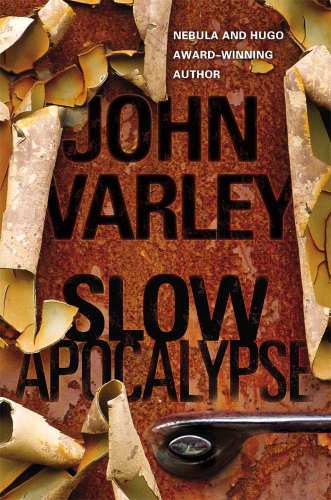
Slow Apocalypse
کتاب های مرتبط
- اطلاعات
- نقد و بررسی
- دیدگاه کاربران
نقد و بررسی

July 16, 2012
The title of this molasses-paced story of global devastation is unfortunately apropos. Dave Marshall has advance notice of the rapid and unstoppable destruction of the world’s oil reserves—originally the plot of Marshall’s next movie script, but now horribly true. In a device familiar to readers of Greg Bear’s Blood Music and Neal Stephenson’s Zodiac, oil-eating bacteria intended for use in a single region spread across the globe. Marshall and his friends survive thanks to being rich and well-prepared, while chaos, starvation, and death happen off-screen and in poorer neighborhoods, remote to Marshall and the reader. Varley optimistically posits a postdisaster “Ecotopia” of happy communism and careful resource use that serves as a traumatizing but effective togetherness retreat for Marshall’s family, saving his marriage and teaching his spoiled wife “a new appreciation for real values.” Varley has thought hard about the myriad ways oil is vital to our entire infrastructure, but he never really gets excited about the consequences of its disappearance.

August 1, 2012
This book starts out with a perfectly good thriller premise: somebody has designed a killer oil-eating bug. It's supposed to turn all the oil in Saudi Arabia into useless sludge and then stop. Unfortunately, it mutates and infects all the oil fields on the planet. The results are predictabledisaster. Fortunately, our hero has had advance warning from an ex-military script consultant and, so, some time to stock up and tell his friends. Strangely, they mostly believe him. Unfortunately for the book, the characters are singularly unlikable, except for the protagonist's bizarrely agreeable teenage daughter, who is not so much unlikable as forgettable. It's a shame that, because of the characters and some choppy writing, the premise is given no chance to shine. It's also a shame because S. M. Stirling's Dies the Fire (2004) handled the sudden destruction of earth's primary energy source (even going so far as to get rid of all combustion reactions) so much better. Still, the interesting premise will draw readers.(Reprinted with permission of Booklist, copyright 2012, American Library Association.)

























دیدگاه کاربران